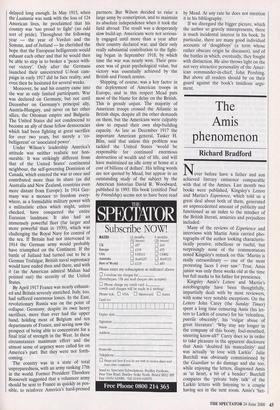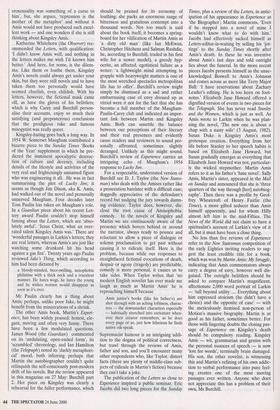The Amis phenomenon
Richard Bradford
Never before have a father and son achieved literary eminence comparable with that of the Amises. Last month two books were published, Kingsley's Letters and Martin's Experience, which told us a great deal about both of them, generated an unprecedented amount of publicity and functioned as an index to the mindset of the British literati, anxieties and prejudices included.
Many of the reviews of Experience and interviews with Martin Amis carried pho- tographs of the author looking characteris- tically pensive, rebellious or rueful, but surprisingly none of the commentators noted Kingsley's remark on this: 'Martin is really extraordinary — one of the most protesting faces I ever saw.' True, Amis junior was only three weeks old at the time but full marks to his father for prescience. Kingsley Amis's Letters and Martin's autobiography have been thoughtfully, impartially dealt with by most reviewers, with some very notable exceptions. On the Letters John Carey (the Sunday Times) spent a long time censuring Amis (his let- ters to Larkin of course) for his 'relentless, puerile obscenity', his 'vulgar abuse of great literature'. 'Why stay any longer in the company of this boozy, foul-mouthed, sneering know-all?' Carey does so in order to take pleasure in the apparent disclosure that Amis 'doubted his masculinity' and was actually 'in love with Larkin'. Julie Burchill was obviously commissioned by the Guardian to do damage and she too, while enjoying the letters, diagnosed Amis as 'at heart, a bit of a bender'. Burchill compares the 'private baby talk' of the Larkin letters with listening to a couple having sex in the next room. Amis's 'het- erosexuality was something of a curse to him', but, she argues, 'repression is the mother of the metaphor' and without it Amis would not have produced such excel- lent work — and one wonders if she is still thinking about Kingsley Amis.
Katherine Whitehom (the Observer) rec- ommended the Letters, with qualification: `I didn't know Amis well, and nothing in the letters makes me wish I'd known him better.' And here, for some, is the dilem- ma. Like them or loathe them, Kingsley Amis's novels could always get under your skin, but they were still novels and to have taken them too personally would have seemed churlish, even childish. With his letters, however, the fictional mask came off, as have the gloves of his belittlers; which is why Carey and Burchill person- alise their accounts, enjoy so much their satisfying (and preposterous) conclusions that the prodigious rake and famous misogynist was really queer.
Kingsley-hating goes back a long way. In 1954 W. Somerset Maugham contributed a bizarre piece to the Sunday Times 'Books of the Year' supplement in which he pre- dicted the imminent apocalyptic destruc- tion of culture and decency, including details of the lifestyle and activities of the very real and frighteningly unnamed figure who was engineering it all. He was in fact summarising the plot of Lucky Jim; it seems as though Jim Dixon, aka K. Amis, had walked out of the novel and personally unnerved Maugham. Four decades later Tom Paulin has taken on Maugham's role. In a Guardian piece about his recent Lot- tery award Paulin couldn't stop himself fuming about the Letters, which are 'abso- lutely awful'. 'Jesus Christ, what an over- rated talent Kingsley Amis was.' There are `wonderful passages in Larkin's letters; they are real letters, whereas Amis's are just like watching some drunkard hit his head against a gas fire'. Twenty years ago Paulin reviewed Jake's Thing which according to him had been dictated by
a bloody-minded, beer-swilling, xenophobic philistine with a thick neck and a truculent manner. He hates wogs, he hates the young and he wishes women would disappear as soon as it's over.
Mr Paulin clearly has a thing about Amis; perhaps, unlike poor Jake, he might benefit from the ministrations of a shrink.
The other Amis book, Martin's Experi- ence, has been widely praised: honest, ele- gant, moving and often very funny. There have been a few modulated questions. James Wood (the Guardian) commented on its 'undulating, open-ended form', its `scrambled' chronology, and Ian Hamilton (the Telegraph) noted its 'darkly metaphori- cal' mood, both inferring perhaps that Martin the autobiographer couldn't quite relinquish the self-consciously post-modern drift of his novels. But the review appeared in this magazine on 27 May: Burchill part 2. Her piece on Kingsley was clearly a rehearsal for the fuller performance, which should be praised for its economy of loathing: she packs an enormous range of bitterness and gratuitous contempt into a thousand words. Not too much is said about the book itself; it becomes a spring- board for her vilification of Martin Amis as `a dirty old man' (like Ian McEwan, Christopher Hitchens and Salman Rushdie, he, according to Burchill, traded in his first wife for a newer model), a greedy hyp- ocrite, an affected, egotistical failure as a writer: 'a lightweight mind attempting to grapple with heavyweight matters is one of the most wretched spectacles metropolitan life has to offer'. Burchill's review might simply be dismissed as a sad and rather embarrassing case of envy dressed up as vitriol were it not for the fact that she has become a full member of the Maugham- Paulin-Carey club and indicated an impor- tant link between Martin and Kingsley Amis. Both can unsettle the balance between our perceptions of their literary and their real presences and evidently cause readers and reviewers to sound per- sonally affronted, sometimes slightly deranged. Unlikely as this might sound, Burchill's review of Experience carries an intriguing echo of Maugham's 1954 response to Lucky Jim.
For a respectable, understated version of Burchill see D. J. Taylor (the New States- man) who deals with the Amises rather like a prosecution barrister with a difficult case; doggedly appreciative of the defendant's record but nudging the jury towards damn- ing evidence. Taylor does, however, dis- close the root cause of Amisophobia: comedy. In the novels of Kingsley and Martin we are continuously aware of the presence which hovers behind or around the narrator, always ready to pounce and reluctant to allow a piece of dialogue or solemn proclamation to get past without causing it to ridicule itself. Here is the problem, because while our responses to straightfaced fictional evocations of death, despair or agony (tragedy) are predictable, comedy is more personal, it causes us to take sides. When Taylor writes that 'no modern English novelist has ever made me laugh as much as Martin Amis' he is reproaching himself because Amis junior's books (like his father's) are shot through with an aching loftiness, charac- ters — the downmarket characters especially — habitually stretched into caricature when- ever their creator remembers, as he does every page or so, just how hilarious he finds native oik-speak.
• Supremacist humour is an intriguing addi- tion to the dogma of political correctness, but trawl through the reviews of Amis, father and son, and you'll encounter many other respondents who, like Taylor, distort facts (there are plenty of middle-class sub- jects of ridicule in Martin's fiction) because they can't take a joke.
The publication of the Letters so close to Experience inspired a public seminar. Eric Jacobs did two long pieces for the Sunday Times, plus a review of the Letters, in antic- ipation of his appearance in Experience as `the Biographer'; Martin comments, 'Even if he stepped into a novel of mine I wouldn't know what to do with him.' Jacobs had effectively sacked himself as Letters-editor-in-waiting by selling his 'jot- tings' to the Sunday Times shortly after Amis's death. In these he was inventive about Amis's last days and told outright lies about the funeral. In the more recent pieces Jacobs presents himself as the unac- knowledged Boswell to Amis's Johnson and comes across as more like Terry Major Ball: 'I have reservations about Zachary Leader's editing. He is too keen on foot- notes.' Elizabeth Jane Howard offered a dignified version of events in two pieces for the Telegraph. She has never read Stanley and the Women, which is just as well. As Amis wrote to Larkin when he was plan- ning the novel, 'The new one is about a chap with a nasty wife' (3 August, 1982). Susan Duke is Kingsley Amis's most grotesque creation. Everything from her life before Stanley to her speech habits is based on Elizabeth Jane Howard, but Susan gradually emerges as everything that Elizabeth Jane Howard was not, particular- ly the wicked stepmother. Martin Amis refers to it as his father's 'hate novel'. Sally Amis, Martin's sister, appeared in the Mail on Sunday and announced that she is 'three quarters of the way through [her] autobiog- raphy'. Then there was a profile by Geof- frey Wheatcroft of Henry Fairlie (the Times), a more gifted seducer than Amis himself apparently, and for whom Hilly almost left him in the mid-Fifties. The News of the World did not claim to have a spiritualist's account of Larkin's view of it all, but it must have been a close thing.
No less than five reviews of Experience refer to the New Statesman competition of the early Eighties inviting readers to sug- gest the least credible title for a book, which was won by Martin Amis: My Struggle, indicating that Amis commentators always carry a degree of envy, however well dis- guised. The outright belittlers should be asked to compare Martin's magnificent, affectionate 2,000 word portrait of Larkin — 'tall beyond utility ... Everything about him expressed stoicism (he didn't have a choice) and the opposite of ease' — with the meticulously itemised non-person of Motion's massive biography. Martin is as good as his father, sometimes better. For those with lingering doubts the closing pas- sage of Experience on Kingsley's death should be compulsory reading. Kingsley Amis — wit, grammarian and genius with the personal nuances of speech — is now `lost for words', terminally brain damaged. His son, the other novelist, is witnessing this and Martin's refining of his own addic- tion to verbal performance into pure feel- ing creates one of the most moving passages ever written. Anyone who does not appreciate this has a problem of their own, Ms Burchill.



































































 Previous page
Previous page